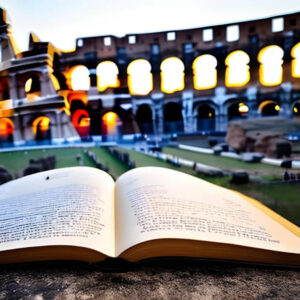Rome is a world-famous city for its works of art, museums, churches, villas and alleyways. A capital with many faces. The charm of antiquity on the one hand, the chaos and traffic jams that many Romans encounter almost every day on the other. It contains thousands of surprises, and if you’re a Roman, you’ll learn to handle it with ease, not getting mad when things go wrong and unleashing typical and legendary Roman cynicism.
It is well known that the ancient Romans had a great sense of humor, loved jokes and jokes, and even accepted that the emperor would make fun of them for their own entertainment. Irony is an outline that colors Roman history through stereotypes and threads that take us directly back to today’s Rome. A sense of humor is closely tied to the Roman personality of not only being spontaneous, honest, generous and loyal, but also lazy and teasing. These qualities are naturally expressed in the Roman dialect, which features lively, straightforward, and often very funny idioms. We’ll list some of them below, avoiding the most trivial ones here.
Esse de coccio
An idiom that describes someone who is difficult to understand or overly dogmatic. For example, children keep playing loudly right under your window. After politely requesting that the volume of your voice be lowered, you can get the children’s attention by saying:
“A regazzi’, allora séte de coccio!” means: “ragazzi, proprio non lo volete capire” (Guys, you really don’t want to get it) combined with a closed hand gesture and a fist-banging gesture when pronouncing the phrase makes everything even more effective. Targets noisy surfaces:
Perhaps the table, or in this case the other palm.

Come er cacio sui maccheroni
This is an expression used when a combination turns out to be perfect or when one thing complements another. Cacio, a generic term for cheese, flavors the macaroni making it even tastier: hence, the Roman saying originates from this concept. The origins date back over a thousand years: in the Middle Ages, in fact, pasta began to be enjoyed with a sprinkling of cheese.
S’è fatta na’ certa
A way of saying to indicate that it’s getting late. Let’s imagine an evening spent chatting pleasantly among friends, perhaps nibbling on something. At some point someone, realizing that it’s already a little past midnight, might say to the others, “Oh, so’ quasi le due: s’è fatta nà certa, namosene a dormì!” which stands for “It’s almost two o’clock, it’s getting late, let’s go to sleep!”
Vecchio come er cucco
The origin of this idiom is uncertain. Some argue that he is derived from one of the oldest sounding toys of antiquity, the whistle “cuco”. However, some consider it an onomatopoeic variant of Habakkuk, one of the twelve prophets of Israel. Habacuc is always depicted as a pensive old man with a long beard. Therefore, it is clear that Romans, as well as Romans, use this expression to refer to something or someone who is no longer young. For example, in Roman traffic, hearing someone say: “Anvedi (guarda), quello che machina: vecchia come er cucco!”
Er giro de Peppe
The full maxim is: “Er giro de Peppe intorno alla rotonda appresso alla Reale“. When the Romans make absurd turns to get to a place, when they spend hours looking for a parking space, and even We also use this expression when we take the wrong direction. The Peppe the proverb refers to is none other than Giuseppe Garibaldi, the rotunda is that of the Pantheon, and the ‘Reale’ is the death procession of King Vittorio Emanuele II of Savoy. In fact, in 1878 a funeral procession was organized to welcome the late King twice around the Pantheon Square. Garibaldi, unaware of this, joined the procession and, instead of staying near the other authorities in front of the monument’s entrance, circled the square twice. These two rounds caught the attention of many and brought the proverb to life.
A chi tocca nun se ‘ngrugna
Deeply echoing Roman sarcasm, this proverb is an invitation not to get upset when things go wrong, when you’re unlucky, or when you have to do something you really don’t like. Derived from the term grugno. Now imagine a carefree dinner at a friend’s house. At the end of it, he might jokingly tell us in an invitation to collaborate: “mo’ i piatti li lavi te! Daje: a chi tocca nun se ‘ngrugna” (litterarly “Come on, wash the dishes!” that means “It doesn’t matter who gets it.”)
Aridaje
An phrase that expresses repetition of a word or action. Indeed, it is no coincidence that the tone that accompanies this word is often frustrating and boring. The Romanesco dialect is colorful, with daje (hurry up), eddaje (strengthen daje), daje tutta(work hard, you can definitely do it) and aridaje. For example, when we leave the house to frustrate our pockets, we often forget our cell phones before we leave the house. You can say: “aridaje, me lo so’ scordato pure oggi” means “I forgot it today too”.
This list of idioms is by no means exhaustive, and many other idioms may exist. For example, we would like to think that someone looks to the Eternal City before a romantic encounter and tonight hums the notes of the famous song “Roma nun fa la stupida stasera.” In fact, the history of Rome is also known through the great songs dedicated to the city, but we will talk about that another time.
Learning these Italian phrases will not only make your trip to Rome more enjoyable, but it will also show locals that you’re making an effort to communicate in the local language.
If you’re interested in learning more Italian for tourists or deepen into Italian culture, consider taking a language course during your trip. Check out our Italian language school in Rome that offer Italian language courses for tourists of all levels.
